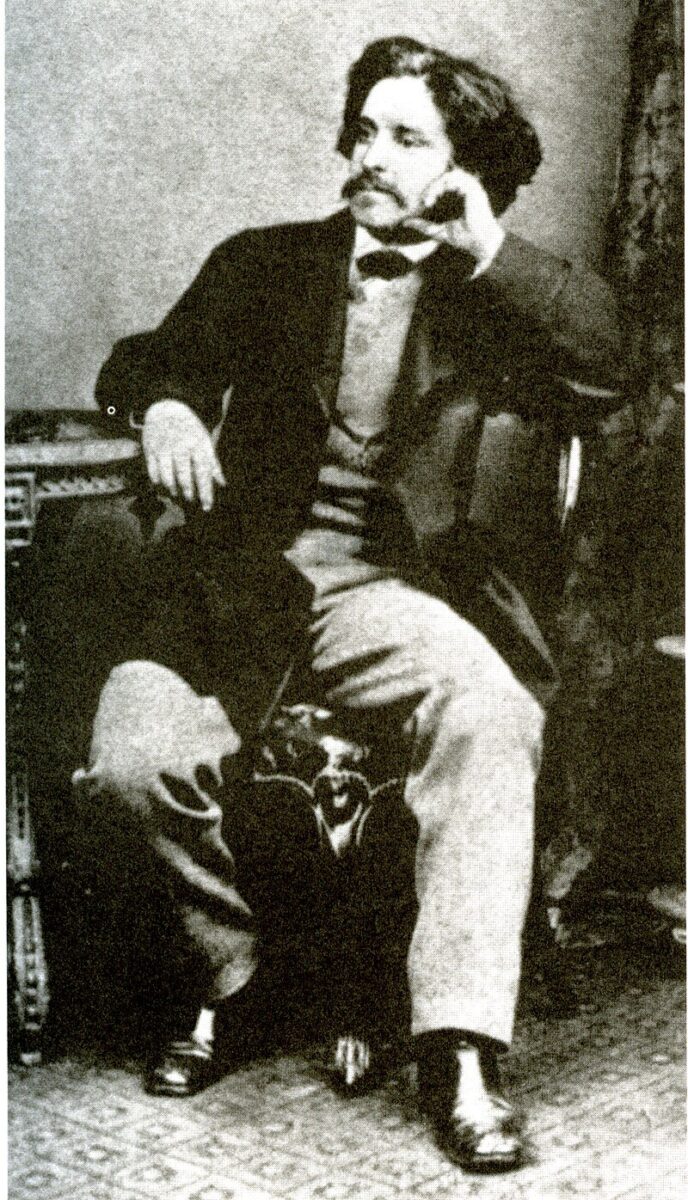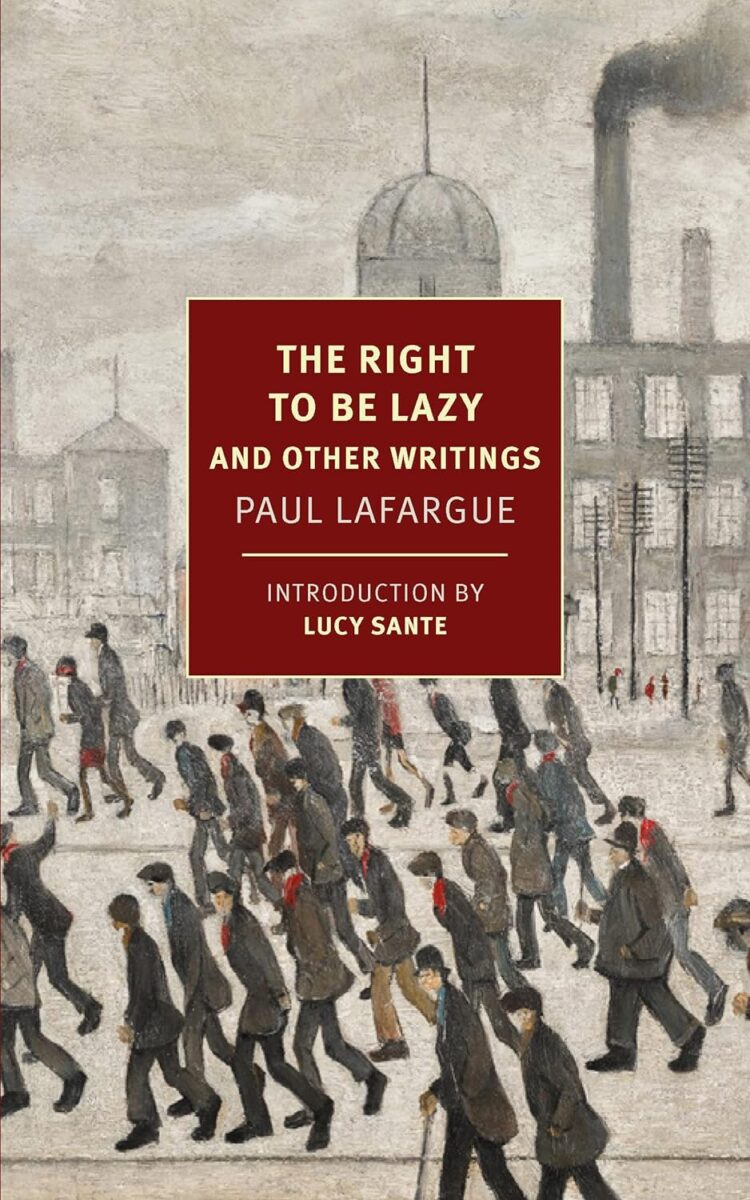Written in 1883, The Right to be Lazy by Paul Lafargue, Karl Marx’s son-in-law married to Laura Marx, is a satire and a polemic that attacks the notion of loving work under capitalism and challenges us to think differently about how our lives might be if we were free from the tyranny of capital.
The Cult of Work Under Capitalism
Lafargue argues that capital has, in a sense, brainwashed us into loving work and that we take pride in working ridiculously long hours. We see this in the notion of the protestant work ethic when you’re on a demonstration and someone shouts, ‘Go back to work’! When people talk about hustle culture, they mean finding ways to monetise every minute of your life, even sleep. Or the refrain from some people: When I was your age, I worked three jobs! Think of modern social media trends like #GirlBoss or the phenomenon known as ‘quiet quitting’ where it is considered a scandal that you only do your set work and contracted hours. You feel guilty if you rest and are not ‘productive’ in some way.
“Lafargue argues that capital has, in a sense, brainwashed us into loving work and that we take pride in working ridiculously long hours.”
Larafgue argues that it is a dogma of work that has been imposed on us and that we have been forced to believe because it serves the capitalist class.

He starts with how capital has developed and how it has changed society. We can see the influence of Marx and the Communist Manifesto, as well as Capital, throughout this short pamphlet. Modern society tears apart the old feudal relations and subsumes all of us into the wage relationship and the dictates of capital. Lafargue writes passionately about how work as organised by capitalists is not just boring or alienating but also dangerous and unjust.
But also, it allows a life of luxury for the rich, the “leisure class” – why are they the leisure class? Why can’t we be the leisure class? Lafargue believes that the capitalists went from abstemious serious business folk to a class of people indulging in lavish and opulent lives. I liked the way he describes the economic relations between masters and wage slaves, of the sons of the capitalists getting syphilis that was treated with quick silver (mercury) at the time, which provided jobs for the mercury miners!
He says that the bourgeois slogan raised in the 19th century, ‘those who do not work shall not eat’ should be turned on the corpulent leisure class to strike the fear of God into them and make them terrified that they might be forced to actually sweat for a living like the proletarians have to do. Of course, their only response was repression and violence; they had to defend the social order of things and the capitalists right to be lazy.
The Irrationality of Overproduction
A main theme of the pamphlet is overproduction. Capitalism is the first economy in human history where it is not natural disasters or shortages of products that are the problem; it is that capitalism is too effective and mass production! Overproduction means that the profits that could be realised decline, and returns on investment also suffer as the market becomes saturated. This leads to recessions, depressions, and unemployment. They produced too much work, not because they wanted to but because their employer demanded it of them.

He describes the working women, the silk workers, and the spinners and weavers as ‘poor creatures working thirteen hours a day who had no time to think of their toilet. Now, they are out of work and have time to rustle in the silks they have made. Ever since they lost their milk teeth, they have devoted themselves to your fortune and have lived in abstinence. Now they are at leisure and wish to enjoy a little of the fruits of their labour.” Of course, these products are denied to them; workers do not own what they make; the capitalists do. And if the capitalist chooses to throw excess products away to protect market prices, then that is what he will do.
Here he is making an ironic point: they are unemployed, so of course they have no wages to pay for any of these fine clothes. But this points to the irrationality of capital for the working people. We made these things; you now cannot sell them, but they were made; why not distribute them? Of course, it cannot be because we rely on selling our labour power; we have to get wages; otherwise, we cannot live. In a waged society, not working means no money. So there are two possible responses to this.
- We can decommodify products so they become ‘free.” They are already produced, so why not just make them readily available?
- Or we can have a form of universal basic income or universal welfare system where you still have an income even during periods of enforced ‘holidays’ from work.
He argues instead that a period of economic downturn should be a chance for a holiday and relaxation, not a period of pain and suffering as we are thrown onto the scrap heap and beg for money to survive. He is critical of the call of the trade unions for work: “Give us work!” or even fighting for the “right to work”. Lafargue argues that the response to workers during periods of unemployment is dogma, a kind of cult of capital that reduces us to begging for work from our masters, who couldn’t care less about us. No, these are bourgeois demands that maintain the status quo. Why not something more radical?
A New World with the Three-Hour Day
Lafargue’s right to be lazy is provocative both in its title and some of its rhetoric, but in reality, the main demand is for the reduction of the working day to three hours. [The working class] “must return to its natural instincts; it must proclaim the Rights of Laziness, a thousand times more noble and sacred than the anaemic Rights of Man concocted by the metaphysical lawyers of the bourgeois revolution. It must accustom itself to working but three hours a day, reserving the rest of the day and night for leisure and feasting.”
He argues that if you removed the contradiction of waged labour and the capitalist class as a leisure class and sent all the soldiers, police, and procurers into meaningful jobs, then there would be so much labour available that it would require an iron law for a total number of hours.
We could redistribute work. Likewise, machinery will no longer confront us as an alienated technology forcing us to work faster and harder before we are eventually replaced by improved machines, but it “will be conquered for social production”.
Larargue pointedly remarks what workers might do with their leisure time if they lived like capitalist loafers do: they could “develop indefinitely their consuming capacities. Instead of eating an ounce or two of gristly meat once a day, when it eats any, it will eat juicy beefsteaks of a pound or two; instead of drinking moderately bad wine, it will become more orthodox than the pope and will drink broad and deep bumpers of Bordeaux and Burgundy without commercial baptism and will leave water to the beasts.” He makes the point that capitalist society is not good for the capitalists. Sure, they live lives of unimaginable wealth (well, the very successful ones do), but they are also deeply alienated from their own humanity. Put simply, the rich are messed up, just in a different way than the poor.
The call for the three-hour day—a 15-hour week—was raised by Lafargue in 1880s France. Today, the most radical voices are calling for a 28-hour week; we have gone backwards in that sense. Lafargue’s argument is that a shorter working week would soak up unemployment, redistribute work from unnecessary or parasitic jobs to meaningful work, and also end overproduction as a system of waste. His argument is that if you have weavers working 13-hour days and introduce machinery to improve their productivity, then you end up with an incredible amount of product, which you cannot shift. This is what leads to an economic crisis as profits decline. Under capitalism, the bosses usually deploy machinery to sack workers; the remaining ones work just as long hours; there are just fewer of them. No, why not reduce the working day? Redistribute the time instead of cutting the work. This is an example of why what is rational from the viewpoint of the worker is not rational from the viewpoint of the capitalist.
“The call for the three-hour day—a 15-hour week—was raised by Lafargue in 1880s France. Today, the most radical voices are calling for a 28-hour week; we have gone backwards in that sense.”
The little pamphlet isn’t perfect, of course. Lafargue routinely uses Rothschilds as symbols of the wider capitalist class, which strikes an antisemitic chord, and he seems to believe that women freed from the drudgeries of waged labour would prefer to be mothers and housewives, which is a little unimaginative about how radically different women’s lives could be. He is also—a little like William Morris, also writing in the 1880s—very positive about the bucolic lives of precapitalist societies and people in the global south, as if they lived lives of wonder and happiness before capitalism came along and forced them into waged labour. A little one-sided considering how difficult life can be as a rural peasant with little access to education or healthcare.
Nevertheless, despite its Victorian-era sensibilities, it has a rousing call to action for everyone forced into waged work. In the final chapter, he describes a new world turned upside down when the working class has taken power and the bosses, the generals, with their hands still soaked with blood from murdering workers, where the hangers on of the capitalist system are forced to tour France, performing a grotesque and absurd play where they act out the brutality of capitalism before they are overthrown in the final act. We can sit and laugh at their performance, realising that stripped of their power, these people are ridiculous fools worthy only of contempt and pity. But the future is bright. “If, uprooting from its heart the vice which dominates it and degrades its nature, the working class were to arise in its terrible strength, not to demand the Rights of Man, which are but the rights of capitalist exploitation, not to demand the Right to Work, which is but the right to misery, but to forge a brazen law forbidding any man to work more than three hours a day, the earth, the old earth, trembling with joy, would feel a new universe leaping within her.”
Art (54) Book Review (127) Books (114) Campism (32) Capitalism (68) China (81) Climate Emergency (99) Conservative Government (90) Conservative Party (45) COVID-19 (46) Creeping Fascism (37) Economics (42) EcoSocialism (60) Elections (83) Europe (46) Far-Right (35) Fascism (62) Film (48) Film Review (68) Fourth International (32) France (72) Gaza (62) History (42) Imperialism (101) Iran (32) Israel (129) Italy (46) Keir Starmer (56) Labour Party (113) Long Read (42) Marxism (49) Marxist Theory (47) Migrants (35) Palestine (182) pandemic (78) Protest (153) Review (31) Russia (343) Solidarity (150) Statement (50) Trade Unionism (144) Ukraine (351) United States of America (139) War (370) Women (32)

